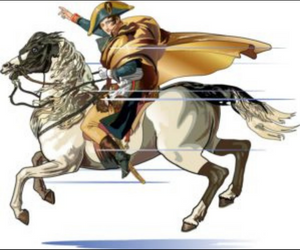What Really Happened to the Dinosaurs?
Pop quiz time! When did the dinosaurs go extinct?
A. 65 million years ago
B. 5 million years ago
C. They didn’t go extinct and if you walk outside today, you may see one.
Up until a few years ago, most people would say the first choice is the correct one. They’d say that there was a great die off of the dinosaurs 65 million years ago, and the dinosaur line ended.
Scientists from The American Museum of Natural History in New York City, however, will give you a surprisingly different answer. They say that answer “c” is correct, that there are still one kind of dinosaur around today. If you visit the Museum’s recently opened Halls of the Dinosaurs, you too will become convinced that not all dinosaurs are extinct.
The experts from the Museum make their case by how the dinosaurs exhibit is displayed. Museums in the past grouped their dinosaur exhibits so that you walked through time. That is, beginning with the earliest animals and proceeding to the most recent ones.
The current exhibit takes a different approach and groups dinosaurs according to their family trees. As you walk from exhibit to exhibit, you walk along the equivalent of the trunk and branches of the dinosaur family tree. For instance, by going through one series of alcoves, you could trace the sauropods, which include the largest animals ever to walk the land. You’d also see early examples of this kind of dinosaur, such as the Plateosaurus, as well as the last kinds before the family went extinct.
Michael J. Novacek, Senior Vice-President and Provost at the Museum, likes this approach. Grouping the dinosaurs by their family branches enables us to see relationships that weren’t obvious before. The most startling insight is that not all the dinosaurs went extinct. Most of the branches of the dinosaur family tree ended in extinction, but one branch did not.
If you walk through the branch of the dinosaur family tree devoted to the thero-pods, which includes Tyrannosaurus Rex , you’ll see a progression of increasingly bird-like creatures that continues right up to today. By the time you get to the Velociraptors, you have come to creatures more closely resembling chickens, pigeons and gulls than they resemble any of the other dinosaurs there.
Like modern birds, they have three-toed hind feet, hollow bones, and elongated arm bones that support wings. The dinosaurs in this branch appear to gradually morph into modern birds.
Birds, we now know, are part of the dinosaur family much like monkeys are part of the primate family. Next time you see a pigeon or any other bird, look at it’s legs and feet and you’ll see the scales that reveal the relationship. Birds, we now know, are feathered dinosaurs.
If you’re ever in New York, do visit the Museum and see the Halls of Dinosaurs. Ellen Futter, the Museum’s president, says the exhibits should accommodate every level of learning and attention span.
Suppose, for instance, that you are with kids and don’t have much time. “The kids,” she says, “will have an exhilarating feeling confronting these spectacular specimens, knowing that they’re real.” But if you have more time, there’s much more to see. The computerized material alone has 40 hours of information on the different dinosaurs.
The Museum is open from 10:00 a.m. to 5:45 p.m. or you can visit it on the Internet at http://www.amnh.org.
Search Blogs
Latest Posts
Architect of Her Life
https://medium.com/@ken.roman_84029/architect-of-her-life-78e38401de71 Publication –medium.com
Meet Clara Kaluderovic
https://canvasrebel.com/meet-clara-kaluderovic Publication – canvasrebel.com
New Jersey drone sightings expose America’s battlefield blind spot
https://www.washingtontimes.com/news/2024/dec/23/new-jersey-drone-sightings-expose-america-battlefi Publication –washingtontimes.com
She Brews Hope and Resilience Even During War
https://foreignpress.org/journalism-resources/she-brews-hope-and-resilience-even-during-war Publication –foreignpress.org
Subscribe to Updates
About Author

Mitzi Perdue is the widow of the poultry magnate, Frank Perdue. She’s the author of How To Make Your Family Business Last and 52 Tips to Combat Human Trafficking. Contact her at www.MitziPerdue.com
All Articles
The Ultimate Soft Skill for Management: EMPATHY
The Ultimate Soft Skill for Management: EMPATHY Want a surprising statistic? (For a hint, it has to do with soft skills.) Eighty-five percent of management success depends on people skills. Cynthia W. Lett, the woman who gives this statistic, has been advising...
Family Businesses Can Learn from Military History
Family Businesses Can Learn from Military HistoryMilitary Culture My late husband was fascinated by military culture, and you could often find him reading the biographies of famous generals. His fascination stemmed from his interest in human motivation. He often...
Family Quarrels & Mediation–Pull Back from the Brink
Family Quarrels & Mediation– Pull Back from the BrinkI hope you’re not reading this because you’re up against a family quarrel. The pain of a family quarrel can permeate every hour of every day. The fallout has the potential of threatening everything we all hold...
What Family Businesses Can Learn From Military Culture
What Family Businesses Can Learn From Military CultureFor longevity and having an extraordinarily strong culture, few organizations can match our military. The military culture of our armed services began before the founding of our country, and it survives to this...
Four Sure-Fire Ways to Stand out in Your Career
Four Sure-Fire Ways to Stand Out in Your CareerA young man in a class I was addressing at a Columbia University business class asked me a poignant question. “How do I stand out in my career?” He was in his mid-twenties, professionally dressed, and his body language...
Family Stories Keep Families Together
Family Stories Keep Families TogetherJackie Kennedy Onassis once said: “If your children turn out well, nothing else matters. If your children turn out badly, nothing else matters.” Having the young people in your life turn out well is as important as anything else...






